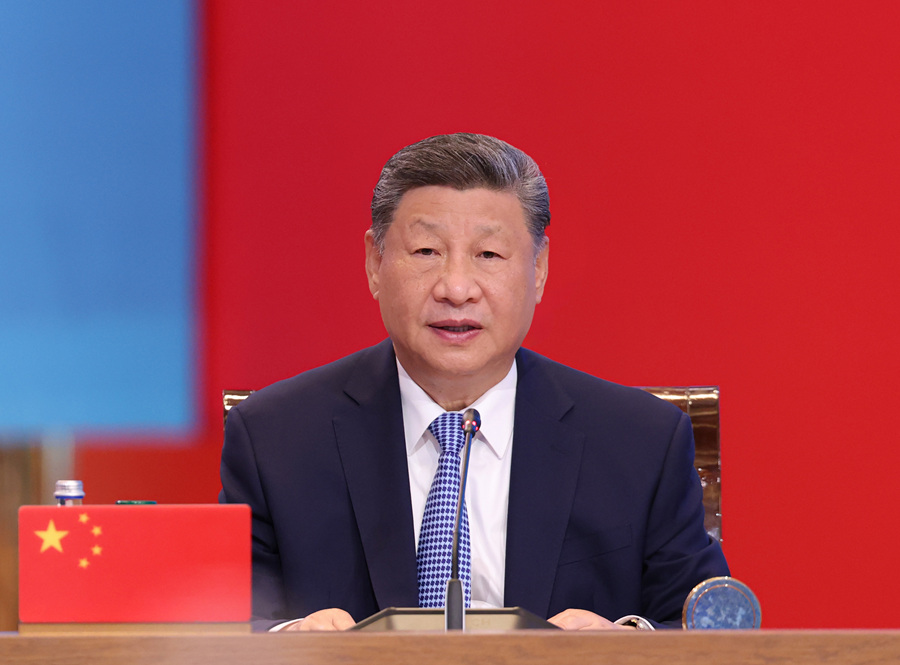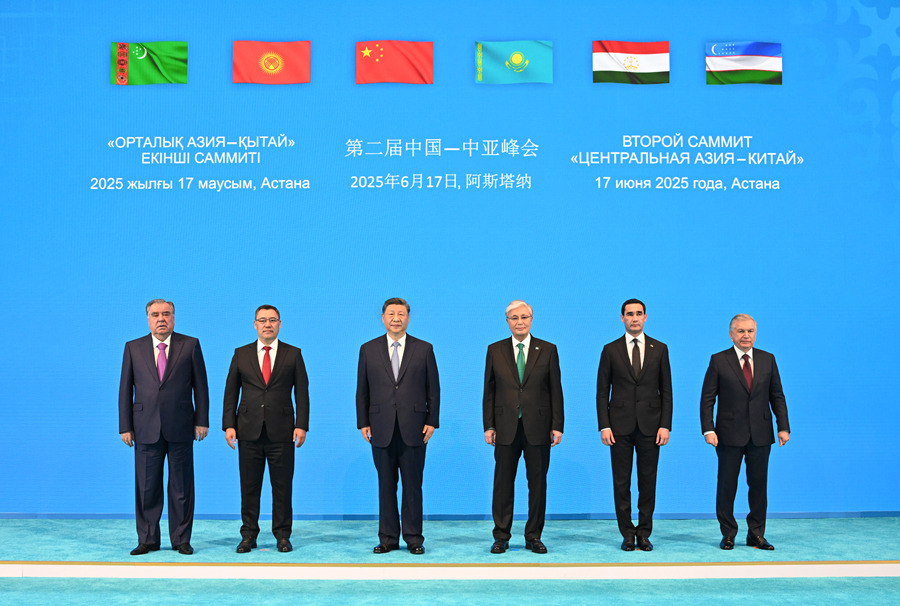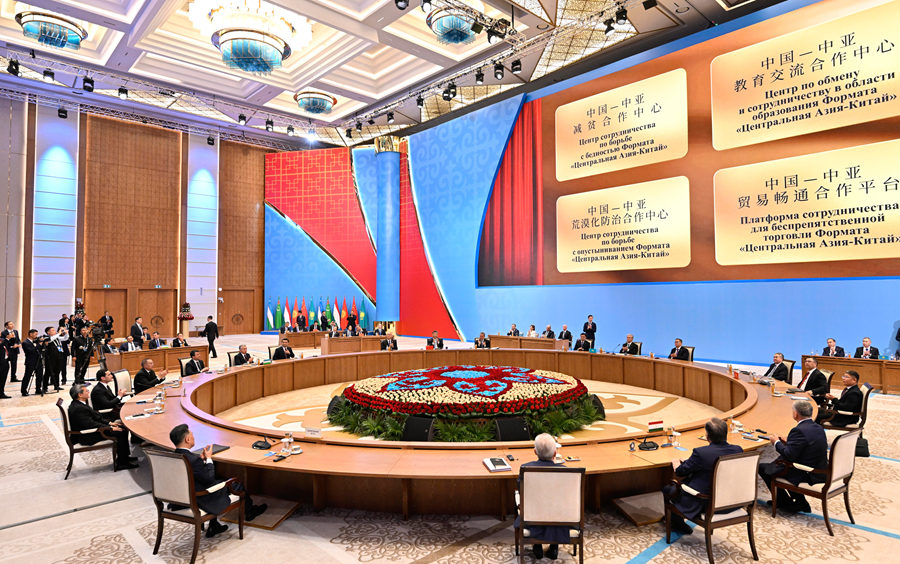We will stay firmly rooted in Chinese culture. We will collect and refine the defining symbols and best elements of Chinese culture and showcase them to the world. We will accelerate the development of China’s discourse and narrative systems, better tell China’s stories, make China’s voice heard, and present a China that is credible, appealing, and respectable.
习近平出席第二届中国—中亚峰会并作主旨发言
发布时间:2025-06-18 08:59:57 | 来源:新华网 | 作者: | 责任编辑:曹川川
当地时间6月17日下午,第二届中国—中亚峰会在阿斯塔纳独立宫举行。哈萨克斯坦总统托卡耶夫主持会议。中国国家主席习近平、吉尔吉斯斯坦总统扎帕罗夫、塔吉克斯坦总统拉赫蒙、土库曼斯坦总统别尔德穆哈梅多夫、乌兹别克斯坦总统米尔济约耶夫出席。这是习近平发表题为《弘扬“中国—中亚精神” 推动地区合作高质量发展》的主旨发言。新华社记者 黄敬文 摄
当地时间6月17日下午,第二届中国—中亚峰会在阿斯塔纳独立宫举行。哈萨克斯坦总统托卡耶夫主持会议。中国国家主席习近平、吉尔吉斯斯坦总统扎帕罗夫、塔吉克斯坦总统拉赫蒙、土库曼斯坦总统别尔德穆哈梅多夫、乌兹别克斯坦总统米尔济约耶夫出席。元首们在友好气氛中共同回顾西安峰会以来中国—中亚各领域合作成果,展望未来发展方向,一致决定弘扬“中国—中亚精神”,坚持永久睦邻友好,携手推动中国—中亚命运共同体建设不断取得新成就。

当地时间6月17日下午,第二届中国—中亚峰会在阿斯塔纳独立宫举行。哈萨克斯坦总统托卡耶夫主持会议。中国国家主席习近平、吉尔吉斯斯坦总统扎帕罗夫、塔吉克斯坦总统拉赫蒙、土库曼斯坦总统别尔德穆哈梅多夫、乌兹别克斯坦总统米尔济约耶夫出席。这是习近平同中亚五国元首集体合影。新华社记者 谢环驰 摄
习近平同中亚五国元首集体合影,随后出席峰会,发表题为《弘扬“中国—中亚精神” 推动地区合作高质量发展》的主旨发言。

当地时间6月17日下午,第二届中国—中亚峰会在阿斯塔纳独立宫举行。哈萨克斯坦总统托卡耶夫主持会议。中国国家主席习近平、吉尔吉斯斯坦总统扎帕罗夫、塔吉克斯坦总统拉赫蒙、土库曼斯坦总统别尔德穆哈梅多夫、乌兹别克斯坦总统米尔济约耶夫出席。这是习近平步入会场。新华社记者 丁林 摄
习近平指出,两年前,我们相聚中国西安,共同擘画了中国中亚合作的“西安愿景”。两年来,中国同中亚国家共建“一带一路”走深走实,各领域合作积极推进,中国—中亚机制四梁八柱基本成型,首届峰会共识全面落地,合作之路越走越宽广,友谊之花越开越灿烂。
习近平强调,我们的合作根植于两千多年的友好往来,巩固于建交30多年的团结互信,发展于新时代以来的开放共赢。在长期实践中,我们探索形成了“互尊、互信、互利、互助,以高质量发展推进共同现代化”的“中国—中亚精神”:坚持相互尊重、平等相待,国家不分大小一视同仁,有事大家商量着办,协商一致作决策;坚持深化互信、同声相应,坚定支持彼此维护国家独立、主权、领土完整和民族尊严,不做任何损害彼此核心利益的事;坚持互利共赢、共同发展,互为优先伙伴,互予发展机遇,兼顾各方利益,实现多赢共生;坚持守望相助、同舟共济,支持彼此走符合国情的发展道路,办好自己的事情,合力应对各类风险挑战,共同维护地区安全稳定。“中国—中亚精神”为世代友好合作提供了重要遵循,我们要始终秉持,不断发扬光大。

当地时间6月17日下午,第二届中国—中亚峰会在阿斯塔纳独立宫举行。哈萨克斯坦总统托卡耶夫主持会议。中国国家主席习近平、吉尔吉斯斯坦总统扎帕罗夫、塔吉克斯坦总统拉赫蒙、土库曼斯坦总统别尔德穆哈梅多夫、乌兹别克斯坦总统米尔济约耶夫出席。这是习近平发表题为《弘扬“中国—中亚精神” 推动地区合作高质量发展》的主旨发言。新华社记者 殷博古 摄
习近平指出,当前,百年变局加速演进,世界进入新的动荡变革期。唯有不移公平正义之心、不坠互利共赢之志,才能维护世界和平、实现共同发展。关税战、贸易战没有赢家,单边主义、保护主义、霸权主义注定伤人害己。历史不能倒退,应当向前;世界不能分裂,应当团结;人类不能回到丛林法则,应当构建人类命运共同体。我们要以“中国—中亚精神”为引领,以更加进取的姿态和更加务实的举措加强合作,推动共建“一带一路”高质量发展,朝着构建中国—中亚命运共同体目标砥砺前行。
一要坚守彼此信赖、相互支持的团结初心。中方始终视中亚为周边外交优先方向,坚持睦邻安邻富邻、亲诚惠容理念方针,同中亚国家平等相交、真诚相待,永远亲望亲好、邻望邻好。六国签署永久睦邻友好合作条约,以法律形式将世代友好的原则固定下来,这是六国关系史上新的里程碑,也是中国周边外交的创举,功在当代、利在千秋。
二要优化务实高效、深度融合的合作布局。我们确定2025至2026年为“中国中亚合作高质量发展年”,要聚焦贸易畅通、产业投资、互联互通、绿色矿产、农业现代化、人员往来等,实施更多具体项目,培育新质生产力。中方决定在中国中亚合作框架内建立减贫、教育交流、荒漠化防治三大合作中心和贸易畅通合作平台,支持中亚国家实施民生和发展项目,未来两年向中亚国家提供3000个培训名额。
三要打造和平安宁、休戚与共的安全格局。我们要加强地区安全治理,持续深化执法安全合作,携手防范和抵御极端思想,坚决打击“三股势力”,共同维护地区和平稳定。中方愿为中亚国家打击恐怖主义和跨国有组织犯罪、维护网络和生物安全提供力所能及的帮助。
四要拉紧同心同德、相知相亲的人文纽带。中方将加强同中亚国家立法机构、政党、妇女、青年、媒体、智库等合作,深入开展治国理政经验交流。愿在中亚开设更多文化中心、高校分校、鲁班工坊,为中亚各国培养更多高素质人才。支持深化地方合作,共同打造从中央到地方、从官方到民间、从毗邻地区到更广区域的“心联通”格局。
五要维护公正合理、平等有序的国际秩序。我们要携手捍卫国际公平正义,反对霸权主义和强权政治,积极推动平等有序的世界多极化、普惠包容的经济全球化。今年是中国人民抗日战争暨世界反法西斯战争胜利80周年和联合国成立80周年。在艰苦卓绝的战争年代,中国同中亚地区人民相互支持、同甘共苦,共同为人类正义事业作出了重要贡献。要弘扬正确历史观,捍卫二战胜利成果,维护以联合国为核心的国际体系,为世界和平和发展注入更多稳定性确定性。
习近平最后指出,中国正在以中国式现代化全面推进强国建设、民族复兴伟业,无论国际形势如何变化,中国始终坚持对外开放不动摇。中国愿同中亚国家一道努力,开展更高质量合作,深化利益融合,实现共同发展,推动中国中亚合作不断取得新的成就!

当地时间6月17日下午,第二届中国—中亚峰会在阿斯塔纳独立宫举行。哈萨克斯坦总统托卡耶夫主持会议。中国国家主席习近平、吉尔吉斯斯坦总统扎帕罗夫、塔吉克斯坦总统拉赫蒙、土库曼斯坦总统别尔德穆哈梅多夫、乌兹别克斯坦总统米尔济约耶夫出席。这是习近平同托卡耶夫握手。新华社记者 谢环驰 摄
哈萨克斯坦总统托卡耶夫等中亚五国领导人一致表示,在习近平主席卓越领导下,中国取得举世瞩目发展成就,感谢中国同中亚国家开展全面合作,为各国带来难能可贵的发展机遇。中国—中亚机制已成为促进双方对话合作、推动中亚各国经济社会发展的重要平台。在充满不确定的世界中,中国—中亚机制的战略意义更加突出,中国的繁荣强大正在惠及周边国家。中国是中亚各国可以永久信赖的战略伙伴和真正朋友。中亚各国高度珍视与中国的相互尊重、平等互利合作模式,期待同中国密切全方位合作,扩大贸易、投资规模,高质量共建“一带一路”,促进工业、农业、科技、基础设施、新能源、互联互通等领域合作,强化区域安全协作,增进文化、教育、旅游等领域人文交流,将中国—中亚机制打造为区域合作的典范,共享发展繁荣,共促和平稳定,构建更加紧密的命运共同体。各方高度赞赏中国在国际和地区事务中发挥的建设性作用,积极支持习近平主席提出的人类命运共同体理念和三大全球倡议,愿同中方密切协调和配合,坚定维护自由贸易和多边贸易体系,共同捍卫国际公平正义。
峰会期间,习近平同中亚五国元首签署《第二届中国—中亚峰会阿斯塔纳宣言》《中华人民共和国同哈萨克斯坦共和国、吉尔吉斯共和国、塔吉克斯坦共和国、土库曼斯坦、乌兹别克斯坦共和国永久睦邻友好合作条约》。
峰会宣布签署共建“一带一路”、人员往来便利化、绿色矿产、贸易畅通、互联互通、工业、海关等领域12份合作文件。峰会期间,中国同中亚五国签署多份友城协议,双方友城数量突破100对。

当地时间6月17日下午,第二届中国—中亚峰会在阿斯塔纳独立宫举行。哈萨克斯坦总统托卡耶夫主持会议。中国国家主席习近平、吉尔吉斯斯坦总统扎帕罗夫、塔吉克斯坦总统拉赫蒙、土库曼斯坦总统别尔德穆哈梅多夫、乌兹别克斯坦总统米尔济约耶夫出席。这是习近平同中亚五国元首共同出席中国—中亚减贫合作中心、教育交流合作中心、荒漠化防治合作中心和贸易畅通合作平台揭牌仪式。新华社记者 殷博古 摄
习近平还同中亚五国元首共同出席中国—中亚减贫合作中心、教育交流合作中心、荒漠化防治合作中心和贸易畅通合作平台揭牌仪式。
各方商定由中国于2027年主办第三届中国—中亚峰会。
当晚,习近平出席托卡耶夫总统为出席峰会的国家元首举行的欢迎宴会。
蔡奇、王毅等参加上述活动。
Xi urges China, Central Asian countries to promote high-quality Belt and Road cooperation

Chinese President Xi Jinping delivers a keynote speech during the second China-Central Asia Summit in Astana, Kazakhstan, June 17, 2025. The second China-Central Asia Summit was held in Astana on Tuesday. Kazakh President Kassym-Jomart Tokayev chaired the summit. Xi, Kyrgyz President Sadyr Japarov, Tajik President Emomali Rahmon, Turkmen President Serdar Berdimuhamedov and Uzbek President Shavkat Mirziyoyev attended the summit. (Xinhua/Huang Jingwen)
Chinese President Xi Jinping on Tuesday called on China and Central Asian countries to promote high-quality Belt and Road cooperation and forge ahead toward the goal of building a China-Central Asia community with a shared future under the guidance of the China-Central Asia Spirit.
Xi made the remarks in his keynote speech at the second China-Central Asia Summit hosted by Kazakh President Kassym-Jomart Tokayev. Kyrgyz President Sadyr Japarov, Tajik President Emomali Rahmon, Turkmen President Serdar Berdimuhamedov and Uzbek President Shavkat Mirziyoyev also attended the summit.
Xi pointed out that during their meeting in Xi'an two years ago, they jointly outlined the Xi'an Vision for China-Central Asia cooperation. Two years on, China and Central Asian countries have further deepened and substantiated Belt and Road cooperation, he said, recalling advanced cooperation in various fields.
The core framework of the China-Central Asia mechanism is largely in place, and the consensus at the first Summit has been implemented across the board, Xi said, adding that the path of cooperation among the countries is steadily widening, and their friendship is blooming ever more brightly.
Xi stressed that the cooperation between China and Central Asian countries is rooted in more than 2,000 years of friendly exchanges, cemented by solidarity and mutual trust cultivated through more than three decades of diplomatic ties, and taken forward via openness and win-win cooperation of the new era.
Xi said building on their collective efforts over the years, the six countries have forged a China-Central Asia Spirit of "mutual respect, mutual trust, mutual benefit and mutual assistance for the joint pursuit of modernization through high-quality development."
The spirit connotes four aspects of practices. First, Xi said that China and Central Asian countries practice mutual respect and treat each other as equals, and all countries, big or small, are equal, adding that the six countries handle issues through consultation and make decisions by consensus.
Second, he said that China and Central Asian countries seek to deepen mutual trust and enhance mutual support, firmly support each other in safeguarding independence, sovereignty, territorial integrity and national dignity, and do not do anything harmful to the core interests of any party.
Third, Xi said China and Central Asian countries pursue mutual benefit and win-win cooperation and strive for common development, view each other as priority partners, and share development opportunities together, adding that they accommodate each other's interests, and work to build a win-win and symbiotic relationship.
Fourth, he said China and Central Asian countries help each other in time of need and stand together through thick and thin, supporting each other in choosing development paths suitable to respective national conditions and in taking domestic matters into their own hands, adding that the countries work together to address various risks and challenges, and uphold regional security and stability.
This China-Central Asia Spirit is an important guideline for their endeavor to carry forward friendship and cooperation from generation to generation, and the six countries should always uphold it and let it shine forever, Xi noted.
Today, unprecedented changes are unfolding at a faster pace across the globe, thrusting the world into a new state of heightened turbulence and volatility, Xi pointed out, noting that a strong belief in fairness and justice, and an unyielding commitment to mutual benefit and win-win cooperation are the only way to maintain world peace and achieve common development.
There is no winner in tariff wars or trade wars, and unilateralism, protectionism and hegemonism will surely backfire while hurting others, he noted.
Maintaining that history should move forward, not backward, and the world should be united, not divided, Xi said humanity must not regress to the law of the jungle, but should instead build a community with a shared future for mankind.
Xi called on the six countries to act on the China-Central Asia Spirit, and enhance cooperation with renewed vigor and more practical measures.
To achieve this, he made five points.
First, China and Central Asian countries should stay committed to the fundamental goal of unity, and always trust and support each other, he said.
China consistently takes Central Asia as a priority in its neighborhood diplomacy, Xi noted, adding that with a firm belief in an amicable, secure and prosperous neighborhood as well as a strong dedication to amity, sincerity, mutual benefit and inclusiveness, China interacts with Central Asian countries on the basis of equality and sincerity, and the six countries always wish their neighbors well.
The six countries will sign together a treaty on eternal good-neighborliness, friendship and cooperation to enshrine the principle of everlasting friendship in the form of law, he said, deeming it as a new landmark in the history of the relations of the six countries and a pioneering initiative in China's diplomatic engagement with its neighbors, which constitutes a milestone for today and a foundation for tomorrow.
Second, China and Central Asian countries should optimize the cooperation framework to make it more results-oriented, more efficient and more deeply integrated, Xi said.
Recalling that the six countries have agreed to designate 2025 and 2026 as the Years of High-Quality Development of China-Central Asia Cooperation, he said that all sides should focus the cooperation on smooth trade, industrial investment, connectivity, green mining, agricultural modernization and personnel exchanges, roll out more projects on the ground and foster new quality productive forces.
He said China has decided to establish three cooperation centers, i.e. on poverty reduction, on education exchange, and on desertification prevention and control, as well as a cooperation platform on smooth trade under the China-Central Asia cooperation framework.
China supports Central Asian countries in developing livelihood and development projects, Xi said, adding that China will provide 3,000 training opportunities to Central Asian countries in the next two years.
Third, China and Central Asian countries should develop a security framework for peace, tranquility and solidarity, step up regional security governance, deepen law enforcement and security cooperation, jointly prevent and thwart extreme ideologies, and resolutely fight terrorism, separatism and extremism, so as to maintain peace and stability in the region, Xi said.
China will do its best to help Central Asian countries combat terrorism and transnational organized crime and safeguard cybersecurity and biosecurity, he said.
Fourth, China and Central Asian countries should cement the bonds of shared vision, mutual understanding and mutual affection between peoples, he noted, saying that China will enhance cooperation between legislatures, political parties, women, youth, media and think tanks with Central Asian countries, conduct in-depth exchange of governance experience, and is ready to set up more cultural centers, university branches and Luban Workshops in Central Asia to train more high-caliber talent for Central Asian countries.
China supports deepening subnational cooperation with Central Asia, Xi said, adding that China and Central Asian countries should nurture heart-to-heart connections at central and subnational levels, between official and non-governmental actors, and from adjacent to broader areas.
Fifth, China and Central Asian countries should uphold a fair and equitable international order and an equal and orderly world structure, stand ready to work with all parties to defend international fairness and justice, oppose hegemonism and power politics, and promote an equal and orderly multipolar world and a universally beneficial and inclusive economic globalization, Xi said.
This year marks the 80th anniversary of the victory of the Chinese People's War of Resistance Against Japanese Aggression and the World Anti-Fascist War, and the 80th anniversary of the founding of the United Nations, he said, recalling that in the strenuous times of war, Chinese and Central Asian peoples supported each other through adversity, and jointly made important contributions to the cause of justice of humanity.
He also noted the need to promote the correct view of history, defend the fruits of the victory of World War II, uphold the UN-centered international system, and provide more stability and certainty for world peace and development.
Xi pointed out that China is building a great modern socialist country in all respects and advancing the great rejuvenation of the Chinese nation on all fronts through Chinese modernization.
No matter how the international situation changes, China will remain unwavering in opening up to the outside world, he said, noting that China is ready to embrace higher-quality cooperation and deepen the integration of interests with Central Asian countries, so as to achieve common development and strive for new progress in China-Central Asia cooperation.
Tokayev and the other four Central Asian leaders unanimously stated that the China-Central Asia mechanism has become an important platform for promoting dialogue and cooperation, as well as for advancing the economic and social development of Central Asian countries.
In a world full of uncertainties, the strategic significance of the mechanism has become increasingly prominent, and China's growing prosperity and strength are benefiting its neighboring countries, they said, noting that China is a strategic partner and a true friend that Central Asian countries can always count on.
The Central Asian countries highly value the model of cooperation with China based on mutual respect, equality and mutual benefit, and look forward to deepening all-round cooperation with China and expanding trade and investment, the five leaders added.
They also expressed the hope to jointly pursue high-quality Belt and Road cooperation, promote cooperation in such fields as industry, agriculture, science and technology, infrastructure, new energy and connectivity, strengthen regional security collaboration, and enhance people-to-people and cultural exchanges in fields like culture, education and tourism.
The leaders of the five Central Asian countries expressed their intention to build the China-Central Asia mechanism into a model of regional cooperation, share development and prosperity, jointly promote peace and stability, and build a closer community with a shared future.
The five parties highly appreciate China's constructive role in international and regional affairs, and actively support the concept of building a community with a shared future for mankind, as well as the three major global initiatives proposed by President Xi.
They also expressed the willingness to closely coordinate and cooperate with China to firmly safeguard free trade and the multilateral trading system, and jointly defend international equity and justice.
During the summit, Xi and the heads of state of the Central Asian nations signed the Astana Declaration of the second China-Central Asia Summit, and a treaty on eternal good-neighborliness, friendship and cooperation.
The meeting also announced the signing of 12 cooperation agreements regarding the Belt and Road cooperation, facilitation of personnel exchanges, green mining, trade, connectivity, industry and customs.
At the summit, China signed multiple sister city agreements with the five Central Asian countries, thus the pairs of sister cities between the two sides have exceeded 100.
Xi and other leaders also witnessed the inauguration of three China-Central Asia cooperation centers and a trade platform, namely the China-Central Asia poverty reduction cooperation center, the China-Central Asia education exchange cooperation center, the China-Central Asia desertification prevention and control cooperation center, as well as the China-Central Asia smooth trade cooperation platform.
All parties also agreed that China will host the third China-Central Asia Summit in 2027.

Chinese President Xi Jinping, Kazakh President Kassym-Jomart Tokayev, Kyrgyz President Sadyr Japarov, Tajik President Emomali Rahmon, Turkmen President Serdar Berdimuhamedov and Uzbek President Shavkat Mirziyoyev pose for a group photo in Astana, Kazakhstan, June 17, 2025. The second China-Central Asia Summit was held in Astana on Tuesday. Tokayev chaired the summit. Xi, Japarov, Rahmon, Berdimuhamedov and Mirziyoyev attended the summit. (Xinhua/Xie Huanchi)

Chinese President Xi Jinping walks into the venue of the second China-Central Asia Summit in Astana, Kazakhstan, June 17, 2025. The second China-Central Asia Summit was held in Astana on Tuesday. Kazakh President Kassym-Jomart Tokayev chaired the summit. Xi, Kyrgyz President Sadyr Japarov, Tajik President Emomali Rahmon, Turkmen President Serdar Berdimuhamedov and Uzbek President Shavkat Mirziyoyev attended the summit. (Xinhua/Ding Lin)

Chinese President Xi Jinping shakes hands with Kazakh President Kassym-Jomart Tokayev in Astana, Kazakhstan, June 17, 2025. The second China-Central Asia Summit was held in Astana on Tuesday. Tokayev chaired the summit. Xi, Kyrgyz President Sadyr Japarov, Tajik President Emomali Rahmon, Turkmen President Serdar Berdimuhamedov and Uzbek President Shavkat Mirziyoyev attended the summit. (Xinhua/Xie Huanchi)

Chinese President Xi Jinping delivers a keynote speech during the second China-Central Asia Summit in Astana, Kazakhstan, June 17, 2025. The second China-Central Asia Summit was held in Astana on Tuesday. Kazakh President Kassym-Jomart Tokayev chaired the summit. Xi, Kyrgyz President Sadyr Japarov, Tajik President Emomali Rahmon, Turkmen President Serdar Berdimuhamedov and Uzbek President Shavkat Mirziyoyev attended the summit. (Xinhua/Yin Bogu)

Chinese President Xi Jinping, Kazakh President Kassym-Jomart Tokayev, Kyrgyz President Sadyr Japarov, Tajik President Emomali Rahmon, Turkmen President Serdar Berdimuhamedov and Uzbek President Shavkat Mirziyoyev witness inauguration of the China-Central Asia poverty reduction cooperation center, the China-Central Asia education exchange cooperation center, the China-Central Asia desertification control cooperation center and the China-Central Asia trade facilitation cooperation platform in Astana, Kazakhstan, June 17, 2025. The second China-Central Asia Summit was held in Astana on Tuesday. Tokayev chaired the summit. Xi, Japarov, Rahmon, Berdimuhamedov and Mirziyoyev attended the summit. (Xinhua/Yin Bogu)

